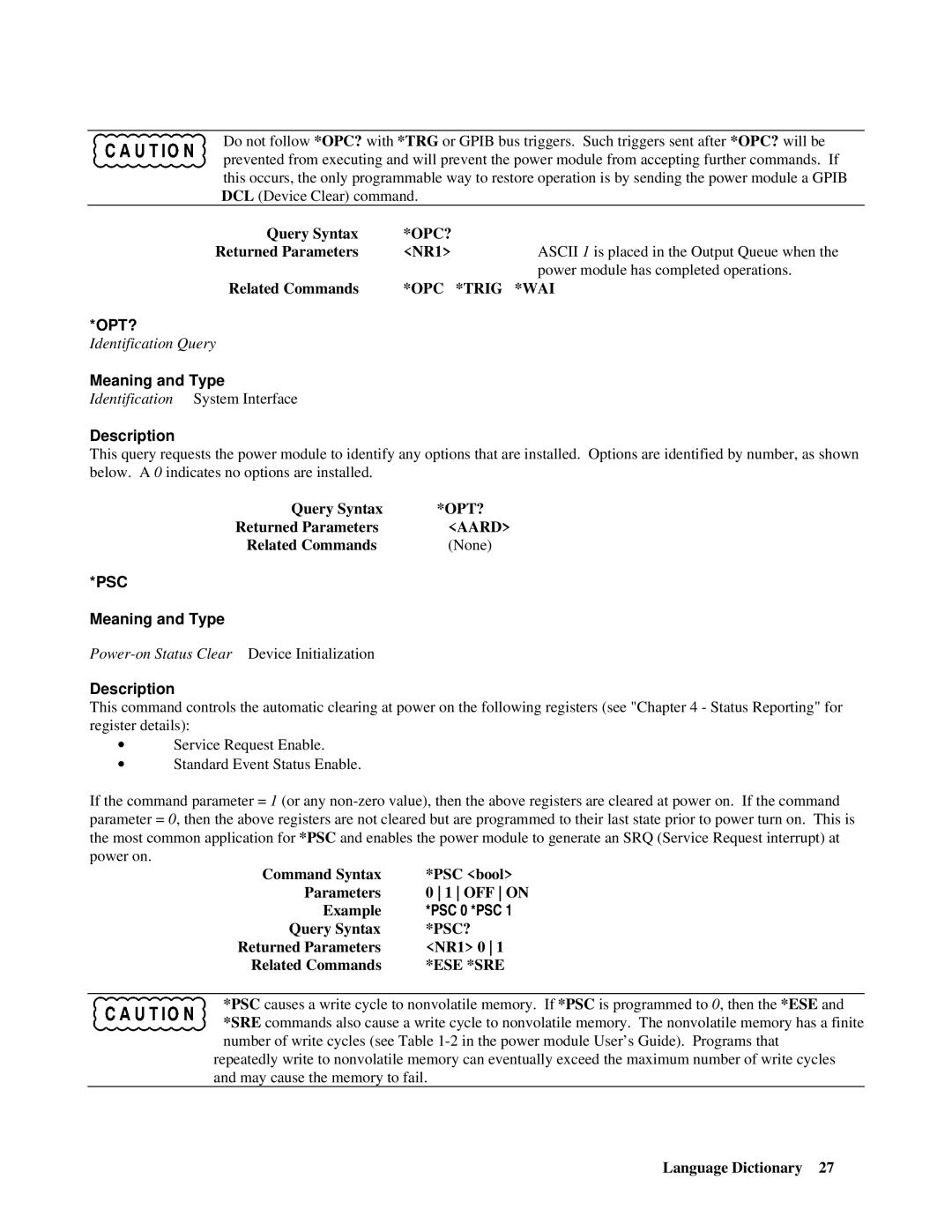Agilent Part No Microfiche Part No Update April
Programming Guide
Safety Guidelines
Contents
Abor
Status Reporting
Synchronizing Power Module Output Changes
Error Messages
Documentation Summary
Introduction
About This Guide
External References
Accessing Online Help
VXIplug&play Power Products Instrument Drivers
Downloading and Installing the Driver
Supported Applications
Module Gpib Address
Gpib Capabilities Of The Power Module
Introduction To Programming
Introduction To Scpi
RST *IDN? *SRE
Volt LEV Prot Curr
Voltlev 8.0 Prot 8.8 CURR?
Outpprotdel
Traversing the Command Tree
Effect of Optional Headers
Voltagelevel 7PROTECTION 8CURRENTLEVEL 3MODE List
Outputprotectionclear STATUSOPERATIONCONDITION?
OUTPUTPROTECTIONCLEARSTATUSOPERATIONCONDITION?
Volttrig 7.5INIT*TRG Outp OFF*RCL 2OUTP on
Listening Formats
Symbol
Numerical Data Formats Talking Formats
Suffixes and Multipliers Class Unit Unit with Multiplier
System Considerations
Assign @PM3TO
Error Handling
Agilent Basic Controllers
Using the National Instruments Gpib Interface
Sending the Command Volt 5 in Basic
Sending the Command Volt 5 in C
Receiving Data from the Module
Receiving Module Data with Basic
Receiving Module Data with C
Language Dictionary
Introduction
Meaning and Type
Description Of Common Commands
CLS
Description
ESE
Bit Configuration of Standard Event Status Enable Register
ESE
ESR?
OPC?
IDN?
OPC
OPT?
PSC
RST
RCL
RCL
SRE
SAV
SRE
TRG
Bit Configuration of Status Byte Register
STB?
WAI
Description of Subsystem Commands
TST?
Abor
Subsystem Tree Diagram Calibration Subsystem
Calauto
Calcurrlev
Calauto 1 Calauto Once
Calcurr
Calpass
Calvolt
Calsave
Calstat
Calvoltlev
Curr 500 MA Currlev
Calvoltprot
Curr
Currmode
Currtrig
Currprotstat
Currprotstat OFF
Currtrig 1200 MA Currlevtrig
Listcoun Listcoun INF
Init Initcont 1 Initcont on
Listcoun
Listcurr
LISTDWELPOIN?
LISTCURRPOIN?
Listdwel
Liststep
LISTVOLTPOIN?
Listvolt
Listvolt 2.0,2.5,3.0 Listvolt MAX,2.5,MIN
MEASCURR? MEASVOLT?
Outp Outpstat ON,NORELAY
Outpprot
Outprelpol
Outpprotcle Outpprotdel 75E-1
Outprel
Norm
Outpttltlink
Outpttlt
Outpttlt 1 Outpttlt OFF
Outpttltsour Link
STATOPERCOND?
STATOPER?
STATOPEREVEN?
Statoperenab
Stat Oper NTR 32 Stat Oper PTR
Statpres
STATQUESCOND?
STATQUES?
STATQUESEVEN?
Stat Ques COND?
Trigger Subsystem
SYSTERR?
SYSTVERS?
Trig
Trigdel .25 Trigdel MAX
Trig Trig IMM
Trigdel
Triglink
Voltmode
Volt
Voltlev
Voltmode List Voltmode FIX
Volttrig 1200 MV Voltlevtrig
VOLTSENSSOUR?
Volttrig
Power Module Programming Parameters
Link Parameter List
Status Reporting
Power Module Status Structure
Status Register Bit Configuration
Operation Status Group
Questionable Status Group
Bit Signal Bit Configurations of Status Registers Meaning
Status Questionable Commands Query
Power Module Status Model
Standard Event Status Group
Location Of Event Handles
Status Byte Register
Output Queue
Initial Conditions At Power On
Examples
STATOPEREVEN?QUESEVEN?
Statoperptr 5376ENAB
Statquesptr 18ENAB
Statoperptr 1024NTR Statoperenab 1024*SRE
Model of Fixed-Mode Trigger Operation
Synchronizing Power Module Output Changes
Trigger Subsystem
Initiated State
Delaying State
Idle State
Trigger Status and Event Signals
Model of List Mode Trigger Operation
INITiateCONTinuous Command
Output Change State
Outpttltsour
List Subsystem
Listcurr 2,3,12,15
Listvolt 3.0,3.25,3.5,3.75 Listdwel 10,10,25,40
Automatically Repeating a List
Triggering a List
Timing diagrams of Liststep Operation
RI Remote Inhibit Subsystem
DFI Discrete Fault Indicator Subsystem
Scpi Command Completion
System Error Messages
Error Messages
Power Module Hardware Error Messages
Standard Event Status Register Error Bits
222 -223 -241 -310 -330 -350 -400 -410 -420 -430
Scpi Conformance Information
Scpi Confirmed Commands
Scpi Approved Commands
Scpi Version
Non-SCPI Commands
Application Programs
Application 1. Sequencing Multiple Modules During Power Up
Figure B1-1. Block Diagram of Application #1
Variations On This Implementation
Figure B1-2. Timing Diagram of Application #1
Enable Output
Reset and Clear Module
Enable Backplane TTL Trigger Drive
Enable Response to Trigger
Implementation Details How The MPS Implements The Solution
MPS Set Up
Figure B2-1. Block Diagram of Application #2
Enable Response to TTL Trigger
When a CV-TO-CC Transition Occurs
Enable TTL Trigger Drive
Start AT 15
Application 3. Controlling Output Voltage Ramp Up at Turn On
Figure B3-1. Simulating a Slow Voltage Ramp
Generating the Desired Voltage Ramp for Application #3
Stop Voltage for Ramp
Option Base
Start Voltage for Ramp
Seconds
Application 4. Providing Time-Varying Voltages
Figure B4-1. Voltage Waveform for Application #4
Module set up
Variations On This Implementation
Enable Detection of OC Condition
Enable OCP
No Delay Before Protection Occurs
Enables Detection on Positive TRANSITION, I.E
Application 5. Providing Time-Varying Current Limiting
Figure B5-1. Typical DUT Current vs. Time
Implementation Details How The MPS Implements The Sequence
Dwell Time Data
GO to 12 V When Triggered
Current Limit Data
SET to GET Current from List
Application 6. Output Sequencing Paced by the Computer
Nominal 12
MPS Set Up
Figure B6-1. Block Diagram of Application #6
To be Tested
These are the Bias
Supply Limit Conditions
Number of Bias Supply Limit C0MBINATIONS
Return
Overview Of Application
Advantages/Benefits Of The MPS Solution
Figure B7-1. Block Diagram of Application #7
Enable SRQ Interrupt
When the Module Indicates SIC Step Completed
When IT Completes the LIST. OPC Generates SRO
Enable Intr Identify Handler Subroutine
Supplemental Information
‘ Conversion to Send Real Numbers Over the BUS
CMD$ = Output on ‘ Enable Output
CMD$ = Initiate ‘ Enable Trigger to Start List
CMD$ = Voltmode List ‘ SET to GET Voltage from List
CONDITION.DATA =
Call Iooutputs SLOTO, CMDS, L
Waiting for Trigger BIT 5 of the Operation Status Register
Wend
‘ Program N3.BAS
‘ Disable Auto Serial Poll
If IBSTA% 0 then Goto ‘ AS Part of the Command String
‘ INSTRUMENT.NAME$ = Sloto
Stop
‘ General Error Handler
If IBSTA% 0 then Goto Selected AS a Trigger Source
Application #3 Controlling Voltage Ramp UP AT Turn on
Dwell = ramptime
To terminate the iooutputa
Int error Char *badstring If error !=
EOl enabled for both read and write
Strcatvlist, vpoint
This is a generalized error checking routine
Index
Index
Index
Index
Index
Agilent Sales and Support Offices
United States Latin America
Manual Updates

